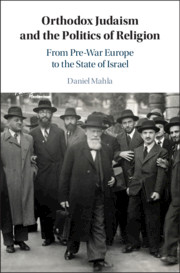Book contents
- Orthodox Judaism and the Politics of Religion
- Orthodox Judaism and the Politics of Religion
- Copyright page
- Dedication
- Contents
- Acknowledgments
- A Note on Terminology
- Introduction
- 1 Of Priests and Prophets
- 2 The Genesis of Orthodox Political Camps
- 3 Interwar Poland
- 4 Divisive Land
- 5 A New Era in Orthodox Relations
- 6 Emerging Israeli Milieus
- Epilogue
- Appendix
- Notes
- Bibliography
- Index
3 - Interwar Poland
Formative Competition within the Kehillah
Published online by Cambridge University Press: 06 March 2020
- Orthodox Judaism and the Politics of Religion
- Orthodox Judaism and the Politics of Religion
- Copyright page
- Dedication
- Contents
- Acknowledgments
- A Note on Terminology
- Introduction
- 1 Of Priests and Prophets
- 2 The Genesis of Orthodox Political Camps
- 3 Interwar Poland
- 4 Divisive Land
- 5 A New Era in Orthodox Relations
- 6 Emerging Israeli Milieus
- Epilogue
- Appendix
- Notes
- Bibliography
- Index
Summary
“Something is rotten in the State of Denmark,” Simon Federbush, head of the Galician Mizrahi and Polish legislator, declared in October 1928 at the movement’s international conference in Danzig (present-day Gdańsk).1 In citing from Shakespeare, Federbush tried to draw attention to the abysmal state of Mizrahi education in the Second Polish Republic. Elementary schools, yeshivas, and many other religious-Zionist institutions throughout the country, he and other Polish delegates noted, were chronically underfunded and in dire need of support. Simultaneously, other attendees accused the Polish branch of insufficiently contributing to the movement’s efforts in Palestine. Ahron Bardt, chairman of the German Mizrahi and an activist in the Jewish Agency, went so far as to say that his Polish colleagues were abandoning the settlement project. Meir Berlin, a member of the party’s executive committee in Jerusalem, reproached the Poles for limiting Mizrahi’s role in the Yishuv to strengthening religious observance. “We appealed to you [for funds],” he added, “but due to the raucous debates in the Sejm, you did not hear our urgent requests.” This bitter exchange was hardly an isolated incident. For some time, religious Zionists had been debating over how to balance their focus on Palestine with the concerns of communities in Europe and North America (i.e., Gegenwartsarbeit). Meir Berlin, among others, felt that Mizrahi should concentrate exclusively on settlement work, rather than engaging in much loathed “Sejm-Zionism.”2 Conversely, Joshua Heshel Farbstein, the head of the Warsaw kehillah, and other representatives stressed the necessity as well as the great value of local activism in Europe. Isaac Rubinstein of Vilna even insisted that Mizrahi’s work in the communities was its true raison d’être. All told, the Polish delegates were the most vigorous proponents of a local emphasis.
- Type
- Chapter
- Information
- Orthodox Judaism and the Politics of ReligionFrom Prewar Europe to the State of Israel, pp. 74 - 103Publisher: Cambridge University PressPrint publication year: 2020



